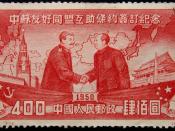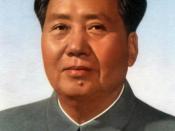CHINA'S COMMUNISM IN THE TWENTIETH CENTURY China, a country with a fifth of the world's population and the last major communist country, is now facing the most uncertain period of its political life since the Communists came to power. China has gambled on a capitalistic market economy to transform its country and lessen the unrest since the demonstrations of Tinananmen Square, although many believe China may be more unstable than ever. On the surface that risk has seemed to have paid off in prosperity. China's cities are being radically changed by private ownership and private business. There have been little, if any, political reforms, market regulations, or social changes to keep pace with one of the most rapid economic growths in China's history.
China's experiment with communism took place under the direction Mao Zedong. He became the chairman of the Communist Party when it took control of China. Premier Zhou Enlai directed all the government departments and ministries.
The U.S.S.R. helped support the new government with military and economic aid. Over a three-year period the government established control and wanted to revive the nation's economy. The government then took lands from landlords and redistributed among the peasants. This distribution of land was a violent undertaking and it is estimated fifty thousand to several million landlords were killed (Wakeman et al 37).
"In 1953, China began its First Five- Year Plan for economic development" (Wakeman et al 37). This plan made many Chinese citizens uncertain about the new government. "From 1953 to 1957, Chinese industry grew at the rapid rate of about fifteen percent a year" (Wakeman et al 37). Within those five years, the communists had brought all the important industries under the control of the government (Wakeman et al 37). The peasants who received landholdings were talked into forming...


